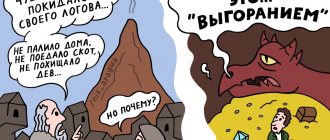Published: October 13, 2021 Category: Spirituality Author: Lyudmila Redkina
Hello dear friends! Lyudmila is in touch.
We all make some discoveries in life: starting with toys in infancy (lo and behold, they can move!), ending with some of the latest technologies. Sometimes these discoveries make us pleasantly happy: who doesn’t like making money on stocks?! But sometimes it becomes uneasy when a friend turns out to be a traitor, and hope for something has collapsed.
Today I will explain in simple words what insight is, how it manifests itself and what it gives to a person.
- Definition
- Why does it occur
- Types of insights in psychology
- Does insight lead to pleasure?
- Insight errors
- In which industries is it used?
- Examples of insights and application in life
- Is it possible to stimulate insights?
- Conclusion
Definition
Insight translated from English. means “insight, illumination.” This is a spontaneous decision of a person, some kind of thought that helps to look at the problem differently. This is an intellectual action that involves a sudden breakthrough, insight, an unexpected decision.
Interestingly, such insights often defy any logical explanation. They arise on the basis of human intuition, which has some experience and knowledge.
When something new is realized, a person enthusiastically declares: “This is about me,” “Oh, this is what I need.” At the mental level, this process appears as a result of the work of the subconscious and intellectual sphere.
The first person to use this term was Wolfgang Köhler at the beginning of the 20th century during experiments on monkeys. After him, K. Duncker and M. Wertheimer began to study this process. They stated that insight is a person’s ability, as a result of mental operations and the work of emotions, to find the right solution to a difficult situation.
That is, this term combines the work of two psychological spheres of a person - cognitive and emotional.
Marketing
In recent years, the term “insight” has also become widely used in marketing and advertising technologies. Here, insight is understood as a certain unconscious push, an urge that forces a potential buyer to choose this particular product or service.
To do this, advertisers must correctly select the “keys” not only to the thoughts, but also to the emotions of their target audience.
Knowledge of the basics of consumer psychology allows the manufacturer to take a number of actions that contribute to the successful promotion of their product to the market:
- Create a product that is in demand by potential buyers.
- Build the right advertising campaign that can emotionally engage the audience.
- Become the most preferred brand in the eyes of the client.
- Subconsciously push the client to take the necessary actions - in this case, to purchase the product or service offered.
At the same time, marketing insight is not at all intended to influence the logical thinking of the buyer. It does not force him to start discussing why this product is better than another. Its goal is to create some emotional urge, impulse, to purchase the product being offered.
Why does it occur
We saw that in the process of insight, thinking and emotions actively work. But how can we understand where exactly this incomprehensible insight comes from?
At first glance, insight seems impossible to predict, it is elusive and cannot be analyzed. But a bad psychologist is one who does not lead to insight and does not calculate it! Let's look at this process from a scientific point of view.
One famous mathematician Henri Poincaré noted that insight has 4 stages:
- Preparation. A person studies a question, looks for as much information as possible on the topic, tries to find a solution using already proven methods, but does not find them. At this time, his unconscious is connected. It seems to receive a request to process information.
- Abstraction. When attempts are unsuccessful, a person switches to another topic and takes a break from the active thought process. But the unconscious has already received the request and continues to work on the question.
- Insight. The human unconscious finds a new non-standard solution, transmits it to consciousness, and the person receives insight. Why? Yes, because in appearance the person is already busy with other things. And then suddenly a brilliant idea strikes him. In fact, he switched externally, but his brain continued searching.
- Examination. And here the consciousness tests this unexpected, unformatted decision. There is an assessment of its correctness, reliability, and a check for lice from the point of view of human experience and knowledge.
Classic examples
Insight in psychology is an almost instantaneous process, the appearance of which requires a split second, but requires long-term and fruitful preparation. As a rule, the birth of a momentary insight in psychologists’ patients can take 1-2 sessions, but for scientists, from the moment of preparation until the insight, years of painstaking collection and comprehension of information can pass.
The most striking examples of insight are:
- Archimedes' law on the statistics of fluids. The ancient Greek scientist simply decided to take a bath when he suddenly noticed that water was pouring out of it in proportion to the weight of the body immersed in it.
- Periodic system D.I. Mendeleev, which the famous chemist accidentally saw in a dream. The scientist’s insight was preceded by a long preparation that took many years, during which the Nobel laureate pondered the arrangement of chemical elements, and finally, turning off his consciousness, he saw the correct sequence in a dream.
- The force of gravity was discovered by I. Newton while drinking tea under an apple tree. The sudden fall of the fruit made the scientist think about the force of gravity that makes apples fall to the ground, and also keeps the Earth from falling into the Sun.
- The idea of an electric motor came to N. Tesla while walking around and was like a lightning explosion, but the moment of insight was preceded by long preparation and study of motor designs, assembly types and electrical specifications.
Similar moments of insight have occurred to countless scientists, writers, musicians and artists and have become a symbol of genius, suggested to conscious thought by the unconscious part of the brain.
Types of insights in psychology
Any person more or less connected with psychology knows that insight is the engine for change.
Therefore, it is psychology that studies insight more than other sciences. And this is what the researchers told us: human insight comes in two types. Now we will look at them:
- Intellectual. A person is aware of his behavior, analyzes it, sees the connection between stimuli and his reactions. For example, it is logical that a centipede on the bed will cause him disgust and a desire to get rid of it. Such an insight may seem unacceptable to others, and they may condemn such behavior. This type of insight is within the person's control.
- Emotional. Some new or long-forgotten old sensation appears that helps a person understand himself, the depths of his psyche. Here emotions are added to intellectual operations. The personality begins to understand himself, to accept all the “cockroaches” and previously rejected, denied sides.
Emotional insight is quite common among those who work on themselves and try to improve. And that’s exactly what we do on this blog!
For example, you notice that you don’t have time to do anything. We read an article about procrastination and realized that you still want to change your life for the better and become happier. And you have an insight: you need to get used to doing things step by step, but start doing it right away! You admitted that there is such a problem, and the unconscious has already found a way out - to break the task into stages and begin to carry them out without leaving the cash register.
Here comes the insight, here comes the changes, here comes a qualitatively new life.
Procedural deadlock
If in a linguistic impasse we fetter ourselves with an unambiguous understanding of the linguistic structure, then the procedural impasse is associated with an unambiguous interpretation of the function of things, the way they are used.
On the left is the famous task of Gestalt psychologist Karl Duncker. The box contains sharp buttons. How to attach a candle to a wall and light it?
Consciousness, based on the picture, identifies only one function of the box - to be a place for storing buttons. And this prevents us from finding the answer: to attach a candle to the wall, you need to shake out the buttons and use them to attach the box to the wall, and then place the candle on the resulting stand.
The same restriction works in the examples on the right, where you need to rearrange just one match so that you get the correct expression. Once we understand that we can move not only matches made from numbers, but also from mathematical operators (+, =), the solution is much easier to find.
“We often only see one use for an item. Experience works against us,” says Nikita.
We can also encounter this limitation at work: when a new situation requires a creative solution, but the brain routinely uses those solutions that were used in the past, but now turn out to be ineffective.
Insight errors
But in this emotional euphoria, do not forget that you are a person, not the Almighty. And you may be wrong. You shouldn’t completely rely on the insights that come to your head. Now I will explain why.
For example, I tend to get hung up on some problem, I can think about it all day long in search of light at the end of the tunnel. I can’t say that it’s bad, sometimes it’s even very good. But! Such looping is fraught with danger: the constant search for a solution does not allow the psyche to calmly understand the problem and process information, and exhausts it.
As a result, a person with his exhausted psyche clings to any solution that comes to his mind. And all because I was already tired of uncertainty and drove myself into exhaustion. The psyche begs for mercy and “sends” at least some more or less adequate solution.
Here's your first mistake - forced insight .
There are also cases of excessive expectations. When some important issues are being resolved, and a person is so waiting for this decision that he jumps into the pool headlong at the first thought that arises.
A striking example of such a mistake is a woman of Balzac’s age who dreams of getting married and rushes at the first man she comes across who more or less fits her criteria. This is the expected insight. She does not want to deal with his position in life, his habits and earnings, his genetics and upbringing. He repeats to himself: “It’s him!” And then he cries into his pillow because he “wasted and abandoned.”
Here's your second mistake - the expected insight .
In which industries is it used?
Insight is a process of intellect and emotion. We have already discussed this with you. Therefore, it occurs in many areas of human life and industries too. Most often it happens in creative professions, but it also manifests itself in others.
In psychology, insights are frequent guests. Without them, a person does not develop. How else can you know yourself and achieve something? Insight gives rise to a qualitatively different personality, but it must be followed by action. For example, a person realized that he was late due to waking up late. And after this insight, he should at least set the alarm clock for an earlier rise.
An entire direction in marketing has been built on the basis of an unexpected solution. Actually, all spontaneous purchasing decisions are based on this process. There is even a name “consumer insight”. And it is now thriving! It is he who moves the entire huge layer of advertising.
In this area, it is important to understand what the motives for acquiring personality are and to play on this. For example, the average buyer always dreams of increasing his status and respect from others. There are problems with self-esteem. But when he declares that he wants to buy a cool smartwatch because of convenience, he is trying to convince himself and others of his most selfless intentions.
And what we see: in this situation, two motives are fighting - true and formal. This is how experienced marketers act on consumer insight and unconscious motives. The advertisement shows the advantages of this product, but also reflects elements of status and success.
Insight in marketing is the elements of success
And there are even rules for creating consumer insight. I will describe them briefly:
- advertising corresponds to the buyer’s dream;
- reflects the key benefit;
- the emphasis is not on thoughts, but on feelings;
- we are talking about the eternal, which has worried and worries man at all times.
All marketing is aimed at the key phrase of consumer insight: “Oh, how did I ever live without this? I really need this!”
Very often, sudden insight occurs in science. Let us remember, for example, Newton, Mendeleev or other scientists. They puzzled over a problem and then used this process to find the right solutions. Archimedes characterized this sudden process very well, exclaiming the phrase known for all centuries: “Eureka!”
A lot of research, inquisitive thoughts of scientists ended with such a “eureka”. Thanks to these discoveries, we now drive a car, use electricity, household appliances and other benefits of civilization.
Insider, insider, insider information
Inside - comes from the English "inside" and can be applied to many phenomena. For example, an insider is a football midfielder who plays both defense and attack. Usually this is a flank player who, in critical moments, makes breakthroughs and attacks that are unexpected for the enemy.
Insight indicates phenomena that occur within the system and acquire the ability to reveal themselves outside.
Therefore, insider information (in the sense of insider information) means secret information, often acquired through espionage means. For example, insider information about securities, exchange rates or events that may affect stock market fluctuations. Such information is what generates income. Knowing something one step ahead is a great success, but it can also be a mistake.
Example 1: let us remember the classic, in the novel by A. Dumas “The Count of Monte Cristo”, the main character gave his opponents false information that Don Carlos (prince, one of the contenders for the throne) was returning to Spain. In accordance with this, Spanish securities should have taken off, but due to the fact that the information was false, the insider worked in the opposite direction, that is, those who bought the bonds ended up losing.
This is an example of a spy insider; you can give less detective, but no less interesting examples.
Example 2: famous billionaire Elon Musk learned that his tweets influence cryptocurrency fluctuations a couple of years ago when he supported Dogecoin. Over the past year, he has spoken out several times about what “coins” he owns, and each time these “unwitting” insights led to noticeable market fluctuations - Ethereum soared by 12%. After it was announced that Tesla would accept Bitcoins, their rate increased by more than 20%. After a short time, Musk changed his mind and Bitcoin fell by 15%. It is naive to believe that at this time the billionaire’s employees were not involved in buying and selling crypto, because at the same time the businessman’s capital grew noticeably.
In this case, it is not immediately clear whether this is a real insider or a false one, whether it was said with intent or not. Musk may have accidentally spilled the beans, but millions read him and perceive every tweet as a revelation. It would be foolish not to use this - a great example of fishing in troubled waters.
Examples of insights and application in life
There are many examples of “eureka” in life. I’ll probably be right if I say that you, too, have experienced an epiphany, as a result of which you achieved something or decided something.
In business, every person started with an insight. First, it was necessary to decide what to do. Secondly, to somehow miraculously resolve all the difficulties and “put things on track.” It's all intellectual and emotional labor. This is where critical thinking comes to the rescue, pushing you to the right decision. Insight can come on your morning jog or during a cold shower.
For example, Misha wanted to become financially independent and start his own business. I read a lot of books on the topic, I was glad that I was able to find purpose and meaning in life when I didn’t want anything. But there is no solution. Where to start is unknown. He spat on everything! And I went on vacation with my penultimate money...
And then – EUREKA! While on vacation, I saw how people made money by renting out sun loungers, towels, etc. And he decided to rent out things that ordinary consumers needed, for example, a car, by the hour. I didn’t earn much, but I got off to a good start: I caught an insight and began to act.
Another example of insight from practice: during a consultation, a mother whose five-year-old boy yells at all strangers, shows aggression and hits his mother. And she thinks that the kindergarten is to blame, her husband is inadequate, everyone around her is bad. But the psychotherapeutic conversation led to the fact that he copies his mother in fits of anger when she is touched to the quick. And as soon as other people’s children take away something personal from the boy, voila, the reaction is not long in coming.
These are the kinds of life insights you encounter every day. For some, the path from a question to the subconscious to a ready-made solution takes days, weeks, even months. For some, “enlightenment” comes quickly.
Inspiration
This is exactly what a person feels when emotional insight occurs. Moreover, inspiration is mixed with incredible spiritual uplift, joy, excitement, ecstasy. You can understand why. After all, the feeling of having an unsolved problem always leads a person to internal imbalance. There are problems that worry people so much that they can neither eat, nor sleep, nor exist in peace.
And when understanding and insight come to them, their balance is restored, and all this is accompanied by inspiration and emotional uplift.
However, not all decisions can be called insight. Most often, the answer comes through a process of careful analysis or a passionate thought process. It is impossible to confuse this with insight. At the moment of insight, a person seems to be covered by a wave of what he has realized. And when he finds a solution himself, he just feels enthusiastic: “Finally, I did it!”
Is it possible to stimulate insights?
No one can say with certainty when the next sudden guess will overtake you. Because it, as a creative process, is impermanent. It cannot be measured with a ruler or planned.
But! Physical laws continue to operate in our lives. And creative people have learned to slightly influence the emergence of insights, to stimulate the “arrival” of non-standard solutions by following certain rules.
So, to catch insight, you need to adhere to 3 points:
- Insight appears based on specific information. This means if you want to increase your income, you should at least read books on financial literacy. Training is important here.
- For insight to come, it is important to give your brain pauses. Take a break, relax, let your mind recover. It will not become exhausted, and more adequate thoughts will come to mind.
- Insights love silence and monotony. They come during monotonous work, games, activities, and when performing routine and boring tasks. For example, to write a dissertation, my teacher played solitaire. And great thoughts came to mind!
And to improve your life, including catching a bunch of insights, you can take an online course or training. Learning from a person who has walked this path will help you believe in yourself and achieve what exactly you want in this life.
One of these people is Nikolai Yagodkin:
- founder of the Advance school with a turnover of more than 400 million per year;
- He has been teaching for 11 years, 80,000+ people have taken his courses.
His online training, Your Course to Success, will accelerate your changes in life.
The course program consists of 4 modules (14 online classes):
- Self-development through self-knowledge. You will understand how to structure your life so that in 100 out of 100 cases you achieve your goals.
- Financial independence. Within a year, you can double your income just by changing your approach to your career.
- Rules and techniques for achieving goals. Nothing will stand in your way anymore, and you will have a clear vision of your goals.
- Motivation. You will learn to consciously spark your ideas and, importantly, take action.
Cost – 990 rub.
Also on our blog there is a detailed review of Nikolai Yagodkin’s Advance school.
Control method
Insight, understood in psychology as insight, although considered synonymous with genius, can still be artificially synthesized by a person.
The search for non-standard solutions should be carried out according to established laws, including:
- The need to accumulate a sufficient scientific, assimilated and processed base of information, since insight does not come from nothing, but from external information that has penetrated into the unconscious, comprehended from books, communication and life experience.
- Creating mandatory pauses that allow the conscious mind to transmit accumulated information to the unconscious part of thinking. A pause can be a rest or a change of activity, which involves complete distraction from the problem of interest. If this condition is not met, as an insight the individual will visit a false insight or fantasy created by a tired and overloaded nervous system.
- A mandatory change of activity, since most often insights arise during long walks, relaxation and activities that bring pleasure, rather than tedious, monotonous work.
A good way, according to scientists, to achieve insight is considered to be meditative practices that allow a person to concentrate on breathing and distract from the thought process.










